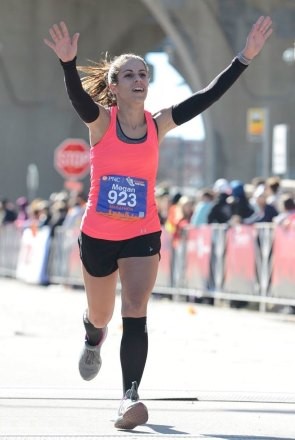An autoimmune disease is a condition in which your immune system mistakenly attacks your body.
The immune system normally guards against germs like bacteria and viruses. When it senses these foreign invaders, it sends out an army of fighter cells to attack them. Normally, the immune system can tell the difference between foreign cells and your own cells. In an autoimmune disease, the immune system mistakes part of your body — like your joints or skin — as foreign. It releases proteins called autoantibodies that attack healthy cells. Some autoimmune diseases target only one organ. Type 1 diabetes damages the pancreas. Other diseases, like lupus, affect the whole body.
Megan Stashak, suffered from ulcerative colitis; an autoimmune disease but it certainly did not stop her from actualizing her dreams. Her determination to keep running races spurred her to look ahead despite her health challenge and today she is a fulfilled woman. Here is her story:

“I was just a teenager when a friend and I went for a fateful run down to the beach in Florida. Suddenly, I had to find a bathroom; I actually sprinted three times looking for bathrooms on that run because of diarrhea. I just figured it was from traveling from cold to hot weather, or perhaps I’d caught a bug.
Running was my life then. I was on the high school cross-country and track teams. But emergencies were becoming an increasingly major part of my life. Even when I wasn’t active, diarrhea and abdominal pains became more frequent and intense.
That summer, I went for a colonoscopy and was diagnosed with ulcerative colitis, a disease that causes inflammation and sores in the lining of the large intestine. I thought: Let’s just treat this, and I’ll be fine.
I began taking the maximum dose of an anti-inflammatory—12 pills a day, which was a lot—but my symptoms still controlled my life. Occasionally, my doctor added steroids, which caused huge emotional swings. I didn’t sleep well. And I’d wake up super-early to rush to the bathroom; sometimes I wouldn’t make it.
It was an emotional decision, but I stopped running. It was too painful, and I’d have to make 10 bathroom stops on a half-mile run. Why bother?
In 2015, I ran my first race. I just kept thinking how fortunate I was to have the strength to run and good health.
Over the years, I read about other drug options. Finally, six years after my initial diagnosis, I switched to a gastroenterologist who was open to new treatments. I felt hope when he said, ‘You’re 24, and you deserve to live your life.’
We tried a different class of drugs that decreased my immune system’s response. They helped, but not enough. Then he suggested an intravenous biologic, which I knew worked for people with inflammatory bowel disease (IBD).
In 2008, I had my first infusion. (I was also taking an oral immune-suppressing drug.) I began to notice that I didn’t have to run to the bathroom as often. I wasn’t 100%, but the urgency was gone.
It took a few years, but eventually, I was able to get back into running, thanks to the improvement in my symptoms. I joined a running group in 2012. And in 2015, I ran my first race. At one point, I was really starting to slow down when I heard my name being chanted—my friends were gathered at a water stop and had everyone there cheering for me.
I know that not everyone with my condition is able to do something as physical as run a race. So, in that moment, I just kept thinking how fortunate I was to have the strength to run and good health.”



